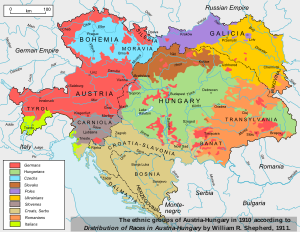Wikipedia:WikiProject Military history/News/September 2014/Book reviews
|
A Mad Catastrophe - Geoffrey Wawro |

![]()
![]()
![]()
![]()
![]()
- By Hawkeye7
Nearly everyone knows that the Great War started as a result of the assassination of Archduke Franz Ferdinand of Austria, but know little about Austria-Hungary, what it was, or the part it played in the war. Count me as another Great War historian who knows the Western Front like the back of his hand, but little about the Eastern Front. This book corrects this a bit. It is one of a number of works on the Great War prompted by its ongoing centennial commemoration, and it is good to see that many of them are about the Eastern Front rather than simply re-hashing the well-trod territory of the Western Front battles. Despite the war of movement, these battles were no less costly than those in the West.
A Mad Catastrophe is a military history of Austria-Hungary from 1866 to 1914. It covers only the first few months of the war, up to the end of 1914, in reasonable detail. The rest of the war is just a few pages in the epilogue, although nobody will be in any doubt about what direction events are headed in. Its focus on Austria-Hungary is fixed, and everybody else is mentioned only in passing. So while this book does an excellent job, if it were the only book on the Great War you ever read, you would be left with a lot of questions.
A little bit more background might have helped the reader. Austria-Hungary came together in the Middle Ages as a result of the threat from the Turkish Empire, which controlled most of south eastern Europe. The different nations in the path of the Turkish Empire rallied together, joining with Hungary and then Austria for protection, but except when the Turks were actually besieging Vienna, the focus of the King was usually on Italy and Germany, where he was the Holy Roman Emperor. For a long time Croatia and Hungary consisted of whatever could be held against the Turks at the time, but the decline of Turkey and Poland led to expansion of the Empire to the east. Napoleon abolished the Holy Roman Empire in 1806, leaving the Austrian Emperor with the part outside Germany. The creation of the new states of Germany and Italy ended the Emperor's role there, while nations conquered by the Turks began asserting their independence.
This is where the book begins, with Austria-Hungary as a dual monarchy consisting of people of many nations, and with no threat from Turkey, the original reason for many of them being in the empire was gone. The Serbs, Italians and Rumanians began thinking about joining the new nation-states of their people, while others, like the Croats and Czechs, began thinking of independence. Even the ruling Germans considered pulling the plug and joining Germany. The problem of running a multicultural state was not new, and not unusual. Every country in Europe had significant cultural and linguistic minorities, but the problem was most acute in Austria-Hungary.
Similarly, the military revolution of the late 19th century posed enormous technical and organisational challenges. Gigantic mass armies would suffer enormous casualties and require astronomical quantities of supplies, particularly ammunition. This affected all belligerents, and while it came as a shock when it happened, was not unforeseen. Again though, for many reasons, the problem was more pronounced in Austria-Hungary. This book explains why in great detail, and covers a series of battles and campaign that were winnable but ultimately disastrously lost.
The big issue is why Austria-Hungary went to war in 1914 when it was as clear then as it is now that it would be a disaster if it won, and a catastrophe if it lost. This book will provide the reader with a much better understanding of the origins of the war.
Publishing details: Wawro, Geoffrey (2014). A Mad Catastrophe: The Outbreak of World War I and the Collapse of the Habsburg Empire. London: Basic Books. ISBN 978-0-465-02835-1.
Recent external reviews |
Penman, Michael (2014). Robert the Bruce : King of the Scots. New Haven, Connecticut: Yale University Press. ISBN 0300148720.
Konstam, Angus (2014). Bannockburn : Scotland's Greatest Battle For Independence. London: Aurum. ISBN 1781312877.
Crawford, Robert (2014). Bannockburns : Scottish Independence and the Literary Imagination, 1314-2014. Edinburgh: Edinburgh University Press. ISBN 0748685847.
- Swaim, Barton (12 September 2014). "Book Review: 'Robert the Bruce' by Michael Penman; 'Bannockburn' by Angus Konstam; 'Bannockburns' by Robert Crawford". The Wall Street Journal.
Wilcox, Craig (2014). A Kind of Victory : Captain Charles Cox and his Australian Cavalrymen. Sydney: NewSouth. ISBN 9780642278579.
- Grey, Jeffrey (29 August 2014). "Book review: A Kind of Victory: Captain Charles Cox and his Australian Cavalrymen". The Sydney Morning Herald.
Moorehead, Caroline (2014). Village of Secrets : Defying the Nazis in Vichy France. New York City: HarperCollins. ISBN 0062202472.
- Lowry, Elizabeth (15 August 2014). "Village of Secrets: Defying the Nazis in Vichy France by Caroline Moorehead". The Guardian.
Dyer, Gwynne (2014). Canada in the Great Power Game 1914-2014. Toronto: Random House Canada. ISBN 0307361683.
- Cook, Tim (29 August 2014). "Canada in the Great Power Game: Gwynne Dyer's latest history has a strange sense of déjà vu". The Globe and Mail.
|


